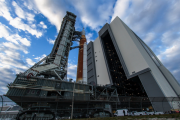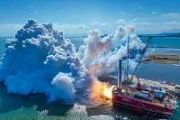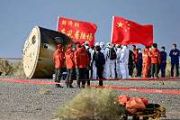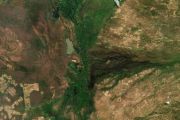
Copernical Team
Fly me to the Moon: US, Japan aim for lunar landing
 Japan and the United States said Monday they want to put the first Japanese astronaut on the Moon as the allies deepen cooperation on space projects.
No non-American has ever touched down on the lunar surface, and Japan has previously said it hopes to achieve a Moon landing by the end of this decade.
President Joe Biden, after his first face-to-face meeting with Japan's Prime Minister Fu
Japan and the United States said Monday they want to put the first Japanese astronaut on the Moon as the allies deepen cooperation on space projects.
No non-American has ever touched down on the lunar surface, and Japan has previously said it hopes to achieve a Moon landing by the end of this decade.
President Joe Biden, after his first face-to-face meeting with Japan's Prime Minister Fu Live now: Living Planet Symposium

Live now: Living Planet Symposium
Watch the Opening Session live from Bonn
Self-cleaning spacecraft surfaces to combat microbes
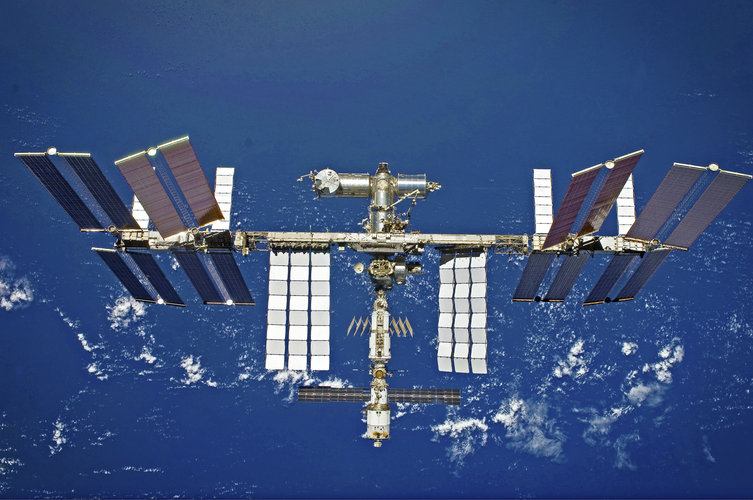
Astronauts live and work in orbit along with teaming populations of microorganisms, which could present a serious threat to health – and even the structural integrity of spacecraft. To help combat such invisible stowaways, an ESA-led project is developing microbe-killing coatings suitable for use within spacecraft cabins.
Satellites and drones can help save pollinators
 Satellites and drones can provide key information to protect pollinators, researchers say.
Their study examines new ways of using these technologies to track the availability of flowers, and says this could be combined with behavioural studies to see the world through the eyes of insects.
The flowers available to insects vary from day to day and place to place, and human activity is
Satellites and drones can provide key information to protect pollinators, researchers say.
Their study examines new ways of using these technologies to track the availability of flowers, and says this could be combined with behavioural studies to see the world through the eyes of insects.
The flowers available to insects vary from day to day and place to place, and human activity is The missing piece to faster, cheaper and more accurate 3D mapping
 Three-dimensional (3D) mapping is a very useful tool, such as for monitoring construction sites, tracking the effects of climate change on ecosystems and verifying the safety of roads and bridges. However, the technology currently used to automate the mapping process is limited, making it a long and costly endeavor.
"Switzerland is currently mapping its entire landscape using airborne lase
Three-dimensional (3D) mapping is a very useful tool, such as for monitoring construction sites, tracking the effects of climate change on ecosystems and verifying the safety of roads and bridges. However, the technology currently used to automate the mapping process is limited, making it a long and costly endeavor.
"Switzerland is currently mapping its entire landscape using airborne lase NASA's HyTEC to Help Jets Burn Less Fuel
 Cleveland OH (SPX) May 20, 2022
What if we told you we could reimagine the way a jet engine works to generate the same amount of power using less fuel?
Our aeronautical innovators are designing a new jet engine that, compared to current engines, will produce the same thrust and even look the same on the outside, but is more fuel-efficient.
HyTEC, or Hybrid Thermally Efficient Core,
Cleveland OH (SPX) May 20, 2022
What if we told you we could reimagine the way a jet engine works to generate the same amount of power using less fuel?
Our aeronautical innovators are designing a new jet engine that, compared to current engines, will produce the same thrust and even look the same on the outside, but is more fuel-efficient.
HyTEC, or Hybrid Thermally Efficient Core, Ghostly 'mirror world' might be cause of cosmic controversy
 New research suggests an unseen 'mirror world' of particles that interacts with our world only via gravity that might be the key to solving a major puzzle in cosmology today - the Hubble constant problem.
The Hubble constant is the rate of expansion of the universe today. Predictions for this rate - from cosmology's standard model - are significantly slower than the rate found by our most
New research suggests an unseen 'mirror world' of particles that interacts with our world only via gravity that might be the key to solving a major puzzle in cosmology today - the Hubble constant problem.
The Hubble constant is the rate of expansion of the universe today. Predictions for this rate - from cosmology's standard model - are significantly slower than the rate found by our most New calculations of Solar spectrum resolve decade-long controversy about the Sun's chemical composition
 Astronomers have resolved the decade-long solar abundance crisis: the conflict between the internal structure of the Sun as determined from solar oscillations (helioseismology) and the structure derived from the fundamental theory of stellar evolution, which in turn relies on measurements of the present-day Sun's chemical composition. New calculations of the physics of the Sun's atmosphere yield
Astronomers have resolved the decade-long solar abundance crisis: the conflict between the internal structure of the Sun as determined from solar oscillations (helioseismology) and the structure derived from the fundamental theory of stellar evolution, which in turn relies on measurements of the present-day Sun's chemical composition. New calculations of the physics of the Sun's atmosphere yield Unraveling a perplexing explosive process that occurs throughout the universe
 Mysterious fast radio bursts release as much energy in one second as the Sun pours out in a year and are among the most puzzling phenomena in the universe. Now researchers at Princeton University, the U.S. Department of Energy's (DOE) Princeton Plasma Physics Laboratory (PPPL) and the SLAC National Accelerator Laboratory have simulated and proposed a cost-effective experiment to produce and obse
Mysterious fast radio bursts release as much energy in one second as the Sun pours out in a year and are among the most puzzling phenomena in the universe. Now researchers at Princeton University, the U.S. Department of Energy's (DOE) Princeton Plasma Physics Laboratory (PPPL) and the SLAC National Accelerator Laboratory have simulated and proposed a cost-effective experiment to produce and obse Hubble Reaches New Milestone in Mystery of Universe's Expansion Rate
 Completing a nearly 30-year marathon, NASA's Hubble Space Telescope has calibrated more than 40 "milepost markers" of space and time to help scientists precisely measure the expansion rate of the universe - a quest with a plot twist.
Pursuit of the universe's expansion rate began in the 1920s with measurements by astronomers Edwin P. Hubble and Georges Lemaitre. In 1998, this led to the di
Completing a nearly 30-year marathon, NASA's Hubble Space Telescope has calibrated more than 40 "milepost markers" of space and time to help scientists precisely measure the expansion rate of the universe - a quest with a plot twist.
Pursuit of the universe's expansion rate began in the 1920s with measurements by astronomers Edwin P. Hubble and Georges Lemaitre. In 1998, this led to the di 

